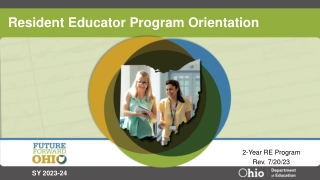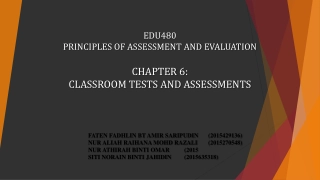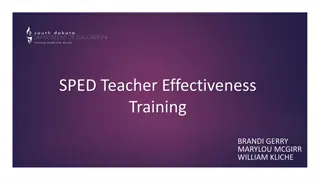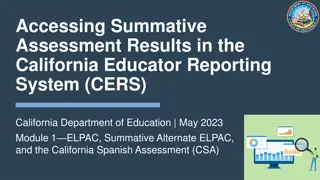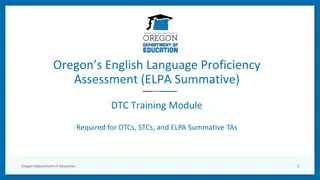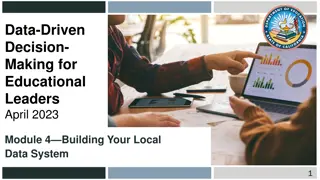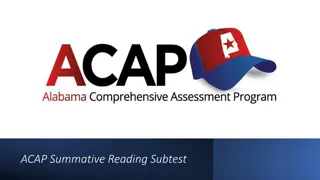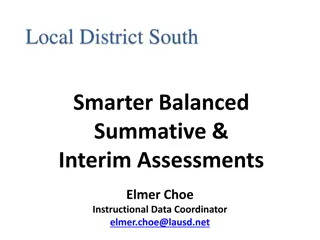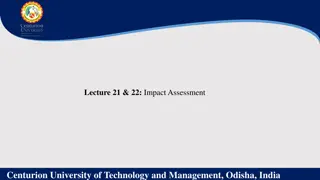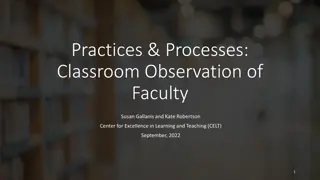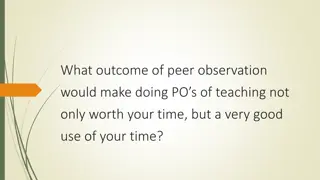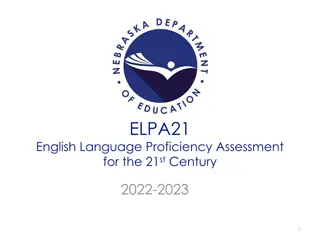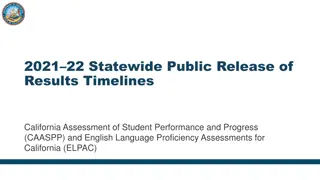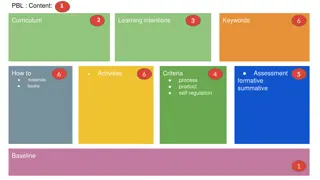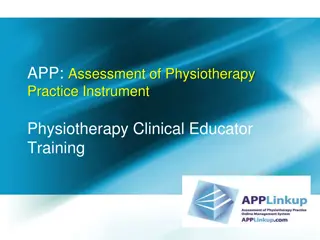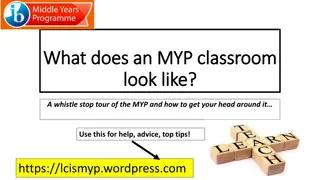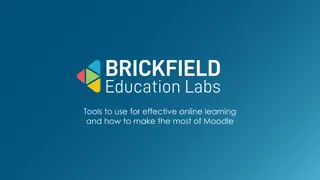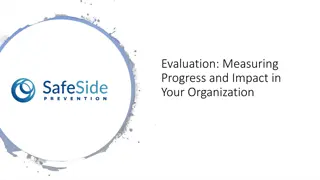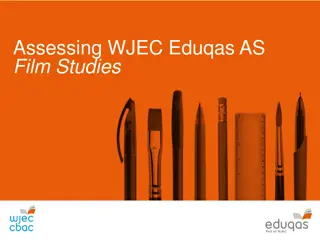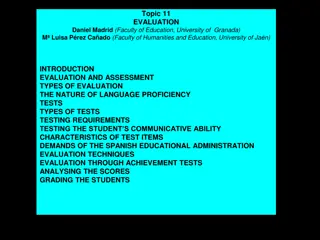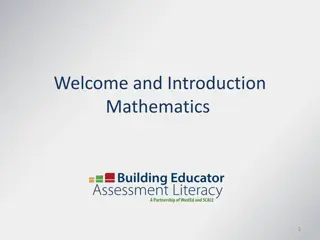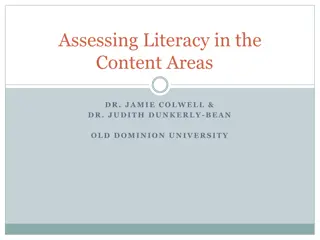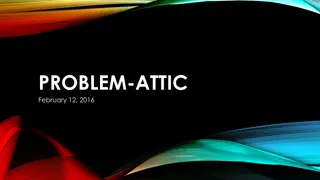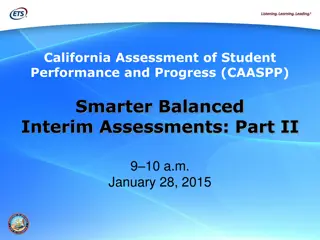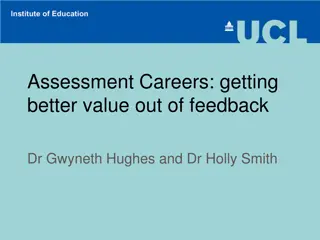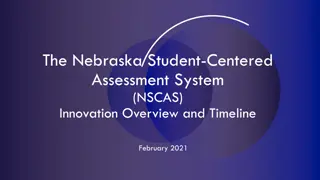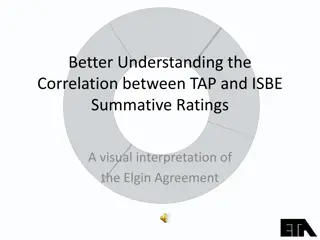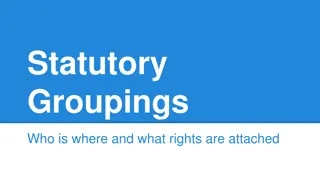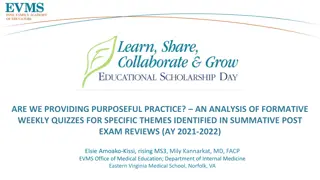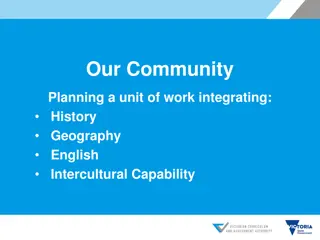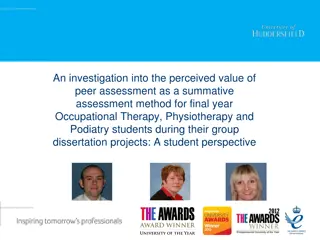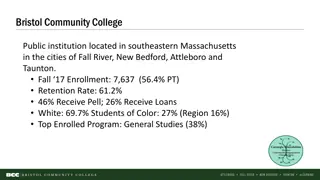Resident Educator Program Orientation
This orientation program provides information on the Ohio Resident Educator Program, including topics such as teacher residency and induction programs, mentoring principles, and the Resident Educator Summative Assessment (RESA). It also discusses the different types of Resident Educator Licenses and
1 views • 26 slides
Classroom Tests and Assessments: Key Steps and Purposes
Understand the importance of classroom testing and assessment in obtaining valid, reliable, and useful information on student achievement. Learn the 8 basic steps involved, different types of tests during instruction, and the significance of end-of-instruction assessments for both formative and summ
3 views • 39 slides
Review of Grading Practices in PWCS and BRMS
This document outlines the assessment and grading practices in Prince William County Schools (PWCS) and Bull Run Middle School (BRMS) with a focus on providing feedback, enhancing student learning, and aligning assessments with learning outcomes. It includes information on assessment purposes, forma
3 views • 12 slides
SPED Teacher Effectiveness Training and Guidelines
This training focuses on enhancing special education teacher effectiveness by covering various aspects such as the SD Teacher Effectiveness Model, Student Learning Objectives, SPED scenarios in relation to the framework for teaching, SLO process, summative scoring matrix, one-year evaluation cycle,
1 views • 53 slides
Accessing Summative Assessment Results in CERS - California Department of Education
Learn about accessing and interpreting Summative ELPAC, Alternate ELPAC, and CSA scores in the California Educator Reporting System (CERS), including navigating CERS, understanding reporting structures, and accessing resources. Explore the comparison between CERS and the Test Results for California'
1 views • 37 slides
Oregon ELPA Summative Assessment Training Module
The Oregon ELPA Summative Assessment is designed to measure English language proficiency in reading, writing, speaking, and listening for students with English learner status. This training module covers topics such as scheduling, administration, key elements, best practices, and the purpose and use
3 views • 19 slides
Enhancing Educational Leadership Through Data-Driven Decision-Making
Explore the importance of establishing a local data system in educational leadership. Learn how to connect classroom data to summative results, utilize real-time data for instructional decisions, and integrate various data sources for effective decision-making. Dive into activities focusing on actio
1 views • 25 slides
Latest Training Opportunities and Updates in Test Administration
Stay updated with the latest training sessions and developments in test administration for California assessments. Explore upcoming training opportunities, enhancements in test operations management, security measures, incident reporting systems, and more. Don't miss out on valuable resources and ma
1 views • 30 slides
ACAP Summative Reading Subtest Updates and Impact Analysis 2023
The ACAP Summative Reading Subtest has undergone updates for Grades 2 and 3 to align with the 2021 ELA Alabama Courses of Study Standards. Changes include additions to reporting categories and adjustments in reading subtest impact data across different years. The upcoming steps involve conducting EL
0 views • 7 slides
Understanding SBAC Summative and Interim Assessments for Instructional Decision Making
Resources and insights are provided for interpreting SBAC summative assessment results and using interim assessments to enhance instructional and curricular strategies. Explore California Assessment of Student Performance and Progress (CAASPP) reporting, scaled scores, achievement levels, assessment
0 views • 60 slides
Impact Assessment in Training and Capacity Building at Centurion University
Impact assessment in training is crucial for enhancing the efficiency of individuals and organizations. It involves formative and summative evaluations to determine the effectiveness of training interventions. Factors like benchmarks, inputs, outputs, outcomes, and impacts are considered to evaluate
1 views • 5 slides
Training Opportunities and Updates for Educators in California
Explore the latest training sessions, resources, and upcoming opportunities for educators in California related to assessments like CAASPP and ELPAC. Find information on accessing assessment results, training webinars, and how to get involved in the assessment development process. Stay informed and
0 views • 22 slides
Classroom Observation Practices and Processes at CELT
Classroom observation practices and processes at the Center for Excellence in Learning and Teaching (CELT) involve faculty observations, formative and summative evaluations, and the utilization of the Teaching Observation Form. Observations are conducted by various stakeholders to promote effective
1 views • 16 slides
Enhancing Teaching Through Effective Peer Observation Practices
Peer observation of teaching can be highly beneficial when conducted with specific outcomes in mind. Key elements include scheduling observations strategically, establishing departmental best practices, distinguishing between summative and formative reviews, and adhering to institutional policies. T
0 views • 23 slides
ELPA21 - English Language Proficiency Assessment Overview
ELPA21 is a comprehensive language proficiency assessment system for English Learners in Nebraska, featuring a dynamic screener and summative tests. The system includes components like the Home Language Survey and various assessments to identify and support English Learners throughout their K-12 edu
1 views • 12 slides
Statewide Release of CAASPP and ELPAC Results Overview
This content provides detailed timelines for the statewide public release of California Assessment of Student Performance and Progress (CAASPP) and English Language Proficiency Assessments for California (ELPAC) results. It covers schedules for test operations, data file availability for parents/gua
3 views • 8 slides
Designing Effective Project-Based Learning Units
Explore the process of creating engaging project-based learning units by delving into themes, curriculum alignment, learning intentions, criteria assessment, and activities. Understand how to connect content with student knowledge, develop learning goals, establish assessment criteria, and plan form
1 views • 8 slides
Assessment of Physiotherapy Practice Instrument Overview
This content provides an in-depth look at the Assessment of Physiotherapy Practice (APP) instrument used for evaluating student performance on clinical placements in Australian Physiotherapy Programs. It covers the development, components, and usage of the standardized instrument, along with its rol
0 views • 37 slides
Welcome to Social Studies Class - Course Overview and Schedule
Sixth-grade students will explore Latin America, Canada, Europe, and Australia in a two-year World Area Studies course. The curriculum covers Geography, History, Government, Economics, and Personal Finance, with opportunities for practical learning such as a trip to the Junior Achievement Center. Th
4 views • 11 slides
Understanding the MYP Classroom: A Comprehensive Overview
Explore the key components of an MYP classroom, including the integration of AtL skills, progression through inquiry questions, and alignment of summative tasks with the statement of inquiry. Discover how students engage with concepts, global contexts, and self-assessment, fostering deep inquiry and
0 views • 17 slides
Effective Online Learning and Moodle Tools
Enhance your online learning experience by leveraging effective tools and maximizing Moodle functionalities with a focus on communication, collaboration, acquisition, student feedback, formative, and summative assessments. Explore innovative approaches and channels for better engagement and learning
0 views • 16 slides
Effective Evaluation Strategies for Organizational Progress and Impact
Learn how evaluation plays a crucial role in measuring progress and impact within organizations. Explore the importance of formative and summative evaluation, along with a detailed approach to clarify evaluation questions and reduce uncertainty. Discover key principles, metrics, sample questions, an
0 views • 7 slides
Understanding and Applying Assessment Criteria in Film Studies
Ensuring objectivity in assessing students' responses is crucial in film studies. Differentiate between formative and summative assessments for a comprehensive evaluation of student understanding. Understand assessment criteria to accurately evaluate objective knowledge and exercise academic judgmen
2 views • 30 slides
The Circuit: Summative Assessment Highlights
Reflecting a creative and interactive summative assessment of the book "The Circuit," this slideshow by Stephanie Tutunjia and others from Humboldt State University offers insight into topics like the Migrant Experience, Social Justice, and more through a Jeopardy-style game. Readers can easily make
0 views • 56 slides
Enhancing Understanding through Assessment in Educational Design Workshop
Learn and collaborate on assessment practices in education design at the "Understanding by Design Assessment Focus" workshop. The agenda includes sessions on summative and formative assessment, feedback, reporting, and more. Engage in activities like generating questions, finding destination partner
1 views • 76 slides
Evaluation and Assessment Techniques in Language Proficiency Testing
Evaluation and assessment in language proficiency testing involve systematic data gathering to assess students' communicative abilities. Different types of evaluation, such as formative and summative, are discussed along with techniques like observation, analysis of work, and creating situations to
0 views • 41 slides
Assessment Literacy Overview - Understanding Different Types of Assessment
Explore the purposes of different types of assessments within a balanced system and delve into the role of performance assessments in providing evidence of student learning. Discover how formative, interim, and summative assessments work together to inform teaching and learning effectively.
0 views • 86 slides
Understanding Effective Literacy Assessment Strategies
Explore various assessment purposes, including formative and summative assessment, affective and cognitive assessment, and strategic content literacy assessment. Engage in activities like T-Charts, SCLAs, and scoring methods to enhance student learning outcomes and teacher strategies.
0 views • 24 slides
Enhancing Assessments with Problem-Attic Program
Discover how Problem-Attic can revolutionize formative and summative assessments by providing access to a vast online test bank with high-quality questions. Easily create tests, worksheets, and slideshows tailored to your curriculum, challenge students, and personalize learning. Engage in hands-on a
0 views • 11 slides
Understanding the 2015 Smarter Balanced Interim Assessments
This informational piece delves into the details of the 2015 Smarter Balanced Interim Assessments, which are part of the broader assessment system designed to aid teaching and student learning. The assessments are optional yet highly recommended, offering valuable insights to teachers for monitoring
0 views • 50 slides
Effective Practices for Peer Review in Remote Teaching
Explore strategies for conducting peer review in remote teaching environments. Discover methods for scheduling observations, comparing in-person and remote peer reviews, understanding summative vs. formative reviews, and complying with institutional policies. Enhance your teaching effectiveness with
0 views • 25 slides
Enhancing Feedback Practices in Higher Education
Exploring issues and solutions related to feedback in higher education, this content discusses challenges faced by students and educators. It emphasizes the importance of constructive feedback and suggests the use of feedback response forms for both formative and summative assessments to enhance stu
0 views • 15 slides
Evolution of Nebraska Student-Centered Assessment System (NSCAS)
The NSCAS has evolved since 2017 to become a more student-centered assessment system, driven by feedback from Nebraska educators. The system aims to provide timely and relevant data to guide instruction, reinforce assessment as a tool for learning, and support the application of learning in real-wor
0 views • 38 slides
The Scottish Education System: An Overview
The Scottish education system offers free schooling to all children, with enrollment required at a nearby school. Primary classes (P1-P7) cater to ages 4-11, while secondary classes (S1-S6) serve 11-17-year-olds. The Curriculum for Excellence (CFE) introduced in 2010 focuses on skill development and
0 views • 18 slides
Understanding Correlation Between TAP and ISBE Summative Ratings
Visual interpretation of the Elgin Agreement showcasing the correlation between Teacher Appraisal Plan (TAP) ratings and Illinois State Board of Education (ISBE) summative ratings. The images illustrate the classifications under TAP - Unsatisfactory, Basic, Proficient, Distinguished, and their corre
0 views • 8 slides
Understanding Statutory Groupings in Teacher Evaluation Systems
Explore the statutory groupings in teacher evaluation systems, including the relationship between TAP and ISBE ratings, factors determining grouping in Group I to Group IV, and the specific rights attached to each group based on summative ratings. Learn who falls into Group 1 and Group 2 based on pe
0 views • 20 slides
Analysis of Formative Weekly Quizzes for Summative Post-Exam Reviews (AY 2021-2022)
In this study, weekly quizzes administered to MD students at EVMS were analyzed to assess the effectiveness of formative practice for summative exams. The analysis focused on specific question types and their distribution across modules, revealing insights into the depth of understanding and integra
0 views • 11 slides
Integrating History, Geography, English & Intercultural Capability in Community Planning
Exploring how to plan a unit of work integrating History, Geography, English, and Intercultural Capability based on the Victorian Curriculum. The unit, "Our Community," spans five weeks and focuses on continuity and change in the local community, significant places, people, and events, and interacti
0 views • 15 slides
Perceived Value of Peer Assessment in Inter-professional Research Projects
Exploring the use of peer assessment as a summative evaluation method for final year Occupational Therapy, Physiotherapy, and Podiatry students during group dissertation projects. Emphasizing the importance of inter-professional collaboration and the ability to provide and receive constructive criti
0 views • 26 slides
Bristol Community College Civic and Service-Learning Assessment
Bristol Community College in southeastern Massachusetts is actively assessing civic and service-learning initiatives. They focus on formative and summative assessments at the institution and course levels, aiming to enhance student learning outcomes across academic, career, personal development, and
0 views • 9 slides
